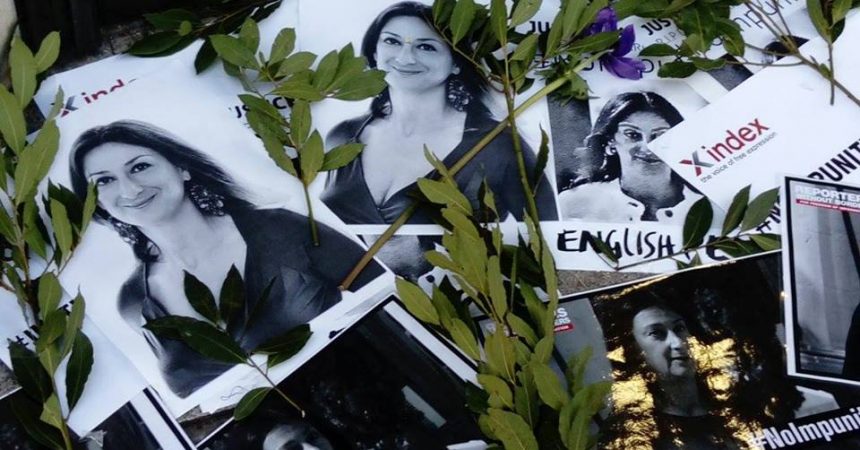The threats and violence suffered by Daphne Caruana Galizia were “tolerated with impunity by the Maltese authorities” which led to her brutal assassination.
These were among the recommendations and observations submitted by a coalition of freedom of expression organisations to Malta’s Universal Periodic Review (UPR) which is a review of the country’s human rights record by the UN’s Human Rights Council.
“The Maltese authorities should begin to view impunity for criminal activity as the greatest threat to the safety of journalists and the effective prosecution of criminal activity, including political corruption, as the only adequate form of protection for journalists investigating and reporting on such crime,” the report said.
The report was submitted by a coalition of freedom of expression organisations, led by PEN International and including Reporters Without Borders, the International Press Institute, Article 19 and the European Centre for Press and Media Freedom.
In their 13-page report, the coalition highlighted a number of concerns relating to legislative restrictions on freedom of expression, the safety of journalists and the lack of media pluralism.
“The tolerance of the authorities for this violence, and ultimately the assassination with impunity of such an important freedom of expression figure demonstrates key violations of freedom of expression of Malta as whole.”
Expressing concern over the “widespread failures” in the investigations into Caruana Galizia’s murder, the coalition said these have serious implications for press freedom and the safety of journalists in Malta.
They also noted that Caruana Galizia was subjected to systematic and escalating intimidation and threats by government officials and their aides and associates.
“Unprotected by Malta’s institutions, including the police force , the attorney-general and the courts, and with only meek and wavering support from the country’s largest media houses, her killing became conceivable.”
They also said that in its response to the Council of Europe’s report on the safety of journalists, government referred to Caruana Galizia as a “hate blogger” the same derogatory term used consistently in government propaganda aimed at isolating and dehumanising her.
The coalition recommended delegating the authority to appoint the leadership of the police and and intelligence gathering bodies to parliament or the organisation itself.
They also said that the attorney-general should not have a prosecutorial role.
“The Maltese authorities should begin to view impunity for criminal activity as the greatest threat to the safety of journalists and the effective prosecution of criminal activity, including political corruption, as the only adequate form of protection for journalists investigating and reporting on such crime.”
Limit influence of individuals and companies on the media
They also said Malta should limit the influence of individuals, companies or groups on the media and seek to ensure that a sufficient variety of media outlets provided by different owners, both public and private, is available to the public.
Noting that Malta is the only EU country “where political parties hold such an extensive media ownership”, the coalition said the appointment procedures at the national broadcaster PBS and the Broadcasting Authority “do not guarantee independence from political interference.”
Moreover, Malta is one of a few countries in Europe which has no policy on media literacy, they said.
The coalition pointed out that according to the preliminary findings of the 2017 Media Pluralism Monitor (MPM) issued by the Centre for Media Pluaralism and Media Freedom (CMPF) “the basic protection of journalists in Malta has deteriorated since 2016.”
The MPM report highlighted several indicators of “high-risk” for media pluralism in Malta which existed before the assassination of Daphne Caruana Galizia.
These include a lack of political independence of public and privately owned media, a lack of media literacy, excessive influence on editorial content by owners and advertisers and cross-media concentration of ownership.
Anti-SLAPP measures
Other recommendations submitted by the coalition refer to other structural problems such as the Media and Defamation Act which will soon be enacted.
This week, government shot down the opposition’s proposals to introduce anti-SLAPP measures in the law.
“The Maltese authorities should immediately and unconditionally make unequivocal public statements against firms who seek to use SLAPP measures against Maltese journalists through jurisdictions outside the EU,” they said.
The organisations also called on government to develop the capacity of the judiciary to effectively identify, examine and “where necessary, dismiss SLAPP lawsuits.”
Noting that defamation will be decriminalised by the new law, the coalition said that in the interim “excessive fines and other harsh penalties for criminal defamation should never be available as a sanction for breach of defamation laws, no matter how egregious or blatant the defamatory statement.”













